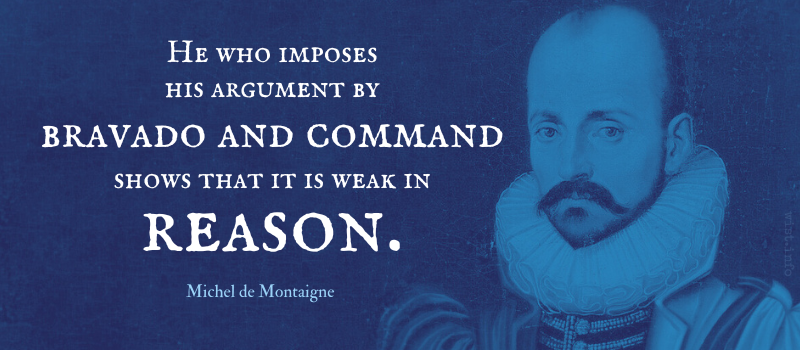You know, that might be the answer — to act boastfully about something we ought to be ashamed of. That’s a trick that never seems to fail.
Quotations about:
bravado
Note not all quotations have been tagged, so Search may find additional quotes on this topic.
HENRY: Once more unto the breach, dear friends, once more;
Or close the wall up with our English dead!
In peace, there’s nothing so becomes a man,
As modest stillness and humility:
But when the blast of war blows in our ears,
Then imitate the action of the tiger;
Stiffen the sinews, summon up the blood,
Disguise fair nature with hard-favored rage ….William Shakespeare (1564-1616) English dramatist and poet
Henry V, Act 3, sc. 1, l. 1ff (3.1.1-8) (1599)
(Source)
He who imposes his argument by bravado and command shows that it is weak in reason.
[Qui establit son discours par braverie et commandement, montre que la raison y est foible.]Michel de Montaigne (1533-1592) French essayist
Essays, Book 3, ch. 11 “Of Cripples [Des Boyteux]” (1587) (3.11) (1595) [tr. Frame (1943)]
(Source)
(Source (French)). Alternate translations:
He that with braverie and by comaundement will establish his discourse, declareth his reason to be weake.
[tr. Florio (1603), "Of the Lame or Cripple"]
Who will establish his Discourse by Authority and Huffing, discovers his Reason to be very weak.
[tr. Cotton (1686)]
He who will establish this proposition by authority and huffing discovers his reason to be very weak.
[tr. Cotton/Hazlitt (1877), "On the Lame"]
He who establishes his argument by defiance and by command shews that his reasoning is weak.
[tr. Ives (1925)]
Any man who supports his opinion with challenges and commands demonstrates that his reasons for it are weak.
[tr. Screech (1987), "On the Lame"]
He who establishes his argument by noise and command shows that his reason is weak.
[Source]




